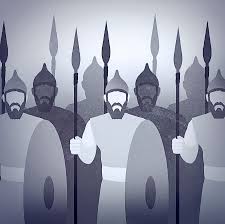Do Not Let Hezekiah Mislead You
36: 13-22
Do not let Hezekiah mislead you DIG: What alternatives does the field commander offer them? Compared to the gods, where is ADONAI in all of this? Do the people respond as expected? Why or why not? Why does the field commander speak in Hebrew to the people on the walls of Jerusalem in 36:11-20?
REFLECT: Have you ever been misled by the world (First John 2:15-17)? Has someone convinced you that the world is more trustworthy than God? When was the last time in your life that someone tried to make sin seem as attractive as possible? Does sin tear at your heart or have you become so calloused that it doesn’t bother you much anymore? If that is the case, what is the solution?

Sennacherib’s field commander hoped that mere logic would undermine the people’s morale and frighten Jerusalem into submission. Calling out to the people in Hebrew, he addresses all who can hear him along the wall of the City. Raising his voice, he said: Hear the words of the great king, the king of Assyria! This is what the king says: Do not let Hezekiah deceive you. He cannot deliver you! Do not let Hezekiah persuade you to trust in the LORD when he says, “The LORD will surely deliver us; this city will not be given into the hand of the king of Assyria” (36:13-15). The irony of this statement is that Sennacherib claimed to be more trustworthy than God! He called upon the people to distrust Hezekiah and made the same points to the people as he had the Jewish delegation. He states that Hezekiah cannot save them. That was true. But once again he made the mistake of saying that the God of Isra’el could not save them (36:7). That, however, was false.
Pressing for a quick decision, the field commander demanded: Do not listen to Hezekiah. This is what the king of Assyria says: Make peace with me and come out to me. Then every one of you will eat from his own vine and fig tree and drink water from his own cistern, until I come and take you to a land like your own – a land of grain and new wine, and a land of bread and vineyards (36:16-17). He made his offer sound as attractive as possible. He could not hide the well-known Assyrian policy of deportation (Second Kings 17:24), but he did his best to sweeten that bitter pill.
But he kept making the same mistake by insisting that it was futile to trust in ADONAI. He said: Do not let Hezekiah mislead you when he says: The LORD will deliver us. Has the god of any nation ever delivered his land from the hand of Assyria? Where are the gods of Hamath and Arpad? Where are the gods of Sepharvaim? Have they rescued Samaria from my hand? Who of all the gods of these countries has been able to save his land from me? How then can the LORD deliver Jerusalem from my hand (36:18-20)? Again the field commander exhorted the people not to be deceived by Hezekiah, for the gods of these other nations had proven useless in helping them against the Assyrians. And he infers that those gods were superior to the God of Isra’el. Therefore, his reasoning is that if greater gods than the God of Jerusalem were of no help, what could your God possibly do? He also boasts that since YHVH did not help Samaria (it had fallen to Assyria 21 years earlier in 722 BC), why should the people of Jerusalem count on their God to protect them? This fatal mistake will bring about his downfall.
The common people were not as easily swayed as the Assyrians expected them to be. But the people remained silent and said nothing in reply, because king Hezekiah had commanded them not to answer him (36:21). But even if Hezekiah had not told his envoys not to answer, it is difficult to see what they could have said. The field commander had bluntly blasphemed ADONAI and told them to surrender or die. There was not much room for negotiation at that point. To their credit, they remained silent (there are times when silence is the most eloquent testimony to who we are and to whom we serve). Blasphemy of that sort would not be corrected with words. No answer was possible. They could only go back in shock and dismay and tell Hezekiah what the field commander had said.
Then Eliakim son of Hilkiah, the palace administrator, Shebna, the secretary, and Joah son of Asaph, the recorder went back to Hezekiah, with their clothes torn, and told him what the field commander had said (36:22). The ball is firmly back in Hezekiah’s court. But this is where the greatness of Hezekiah is seen. He sees what needs to be done, and he does it.



Leave A Comment